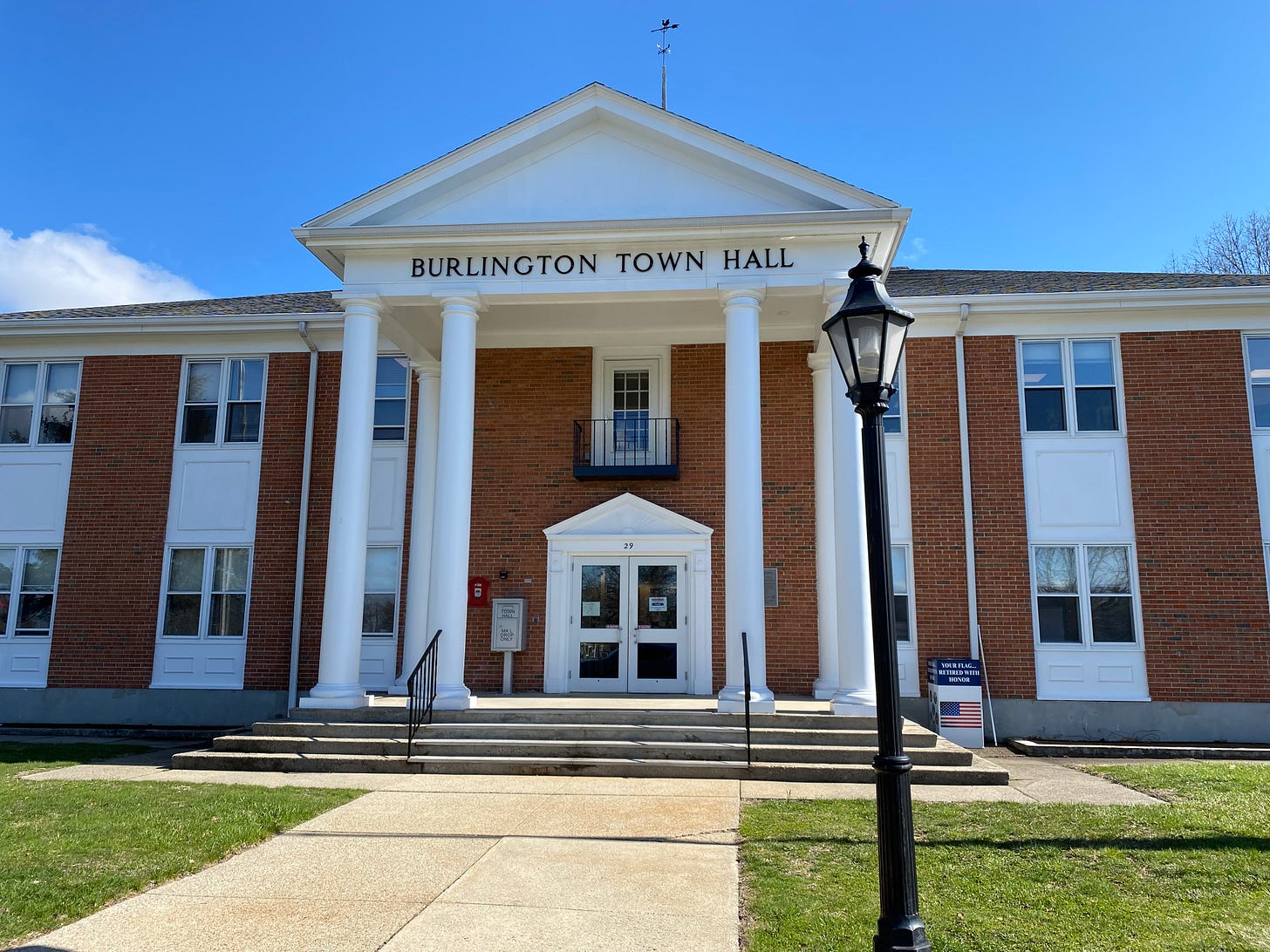Previously we talked about why Burlington is a town rather than a city, and what exactly the Town Meeting form of government is and does.
Town Meeting is unique to new England, and Representative Town Meeting (where people are elected to represent their precincts, rather than any resident being able to show up and vote) is even more unique, with fewer than 10% of towns having adopted it.
But, like anything, government is not static, and there have been rumbles of wonderings for a while about whether or not we have the right kind of government for our town. Should we have a Town Manager instead of a Town Administrator? Should we adopt a city form of government, where we have a Mayor and a City Council?
Here is a little of the history of government in Burlington. Most of this information is taken from the Select Board Meeting of December 11, 2022, starting at about 1:40, where Town Counsel, Lisa Mead, spoke about this topic.
Our municipal government was chartered in 1790 (9 years before we became an independent town, in case you’re counting). I looked for the original text of the charter, but it looks like the Internet doesn’t have it. Know who I bet does? The Town Clerk’s office. Or maybe Burlington Retro, who coincidentally has a story about our first-ever Representative Town Meeting this week. At any rate, the charter basically says that we agree to run the town like other Massachusetts towns are run. From that point on, we had an Open Town meeting like most other municipalities in the state.
In 1970, though, we adopted Representative Town Meeting (RTM) by special act. Since then, we haven’t made any major changes to the government—and that’s to be expected. But the question has been posed whether or not we have outgrown Town Meeting, or whether, at the very least, we should have a Town Manager rather than a Town Administrator.
Essentially, there are two ways to make big changes (changing the legislative body, changing terms of elected positions, changing the powers of the Chief Executive Office) if the Town decides they’re necessary: Create a charter commission to change or recreate the charter, or pass a special act.
For smaller things that are more operational than governmental—like changing a position from elected to appointed, consolidating positions into a department—you can create a town government study committee to enact those changes.
We actually did have a Government Review Committee in 2018, and they presented several recommendations to the Select Board when their work was complete. According to Select Board Member Mike Runyan, they found a lot of duplication of effort in what different committees and positions were responsible for. However, other than the shift of the Treasurer/Collector position from elected to appointed, it seems like the work stopped there. Some of their recommendations for further study:
Elected v. Appointed positions - I can still think of at least one elected position that makes no sense to be elected, because of the deep specialized knowledge it requires
Town Manager v. Town Administrator - The main difference here is a matter of independence: A Town Manager has more autonomy to negotiate, hire, fire, and manage without needing Select Board approval for everything
Personnel and management reporting structure
Improved internal and external communication - This has been an emphasis of this administration, but I haven’t heard any plans discussed recently
Involve an independent agency to conduct a comprehensive analysis - it’s been 50 years (since that 1970 special act that opened us up to RTM) since such an analysis has been performed
So, how do we know if changes are warranted?
One option is to create a Charter Commission of 9 individuals and some ideas for what they might look into, both of which must be jointly approved by voters as a ballot question. The Commission would then have 10-18 months to hold meetings and public hearings and come up with a charter proposal, which would be voted on by voters at large.
As mentioned, another way we could make a change is to write a special act—this special act must be adopted by Town Meeting and then go to to the state legislature. And, if the act is a significant enough change, the legislature might approve it on the condition that the voters also approve it—in which case it would need to be placed on the ballot just as above. This actually happened in 1970 when we transitioned from Open to Representative Town meeting.
Either way, any kind of change would need to be accompanied by an education campaign so voters know what kinds of changes we are looking to implement, what the benefits and drawbacks would be, and how they would be affected.
After discussion at the December 11, 2022, Select Board meeting, the next steps were to review the report created by that 2018 committee to see if they can narrow the scope and charge of any new committee that might be created. Of course, I’ll keep you updated.
The numbers in this document are old, but this is an interesting quick review of the different kinds of Massachusetts governmental structures, along with some pros and cons.
Pros and cons to different forms of government in Massachusetts (Massachusetts Municipal Association)





